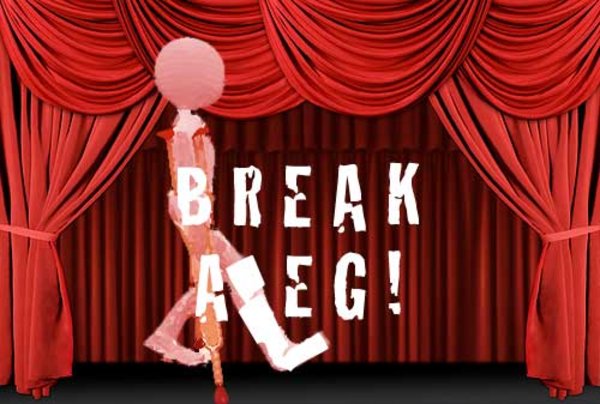- 用心翻译每一天
联系我们
全国统一服务热线:
电话:021-58446796
公司QQ:732319580
邮箱:daisy.xu@easytranslation.com.cn
网址:www.easytranslation.com.cn
地址:上海浦东金桥开发区金豫路700号6号楼1楼
译锐小编: 为什么在演出人员/表演者上台表演之前,我们要和对方说break a leg?break a leg是表示摔断腿的意思吗? "Break a leg" is one piece of performer lingo that has leaked into the mainstream. Originally, it was used by actors and musicians to wish their colleagues good luck before going on stage. Today, even people outside the entertainment world know the meaning of the idiom, but few people probably know where it comes from. “Break a Leg”是演出人员所说的一句行话,目前这句行话已成为主流。最初,“break a leg”这句话是演员和音乐人祝即将上台表演的人好运。如今,即使是娱乐行业以外的人也了解了这一习语的含义。但是,关于这个习语的出处,了解的人却知之甚少。 The common story behind "break a leg" is that it began as a replacement for "good luck"—a phrase that's actually considered bad luck if spoken out loud in theater. The superstition is real, but it doesn't explain why actors started wishing each other bodily harm instead. 关于“break a leg”的来历,最初始于“good luck”的替代说法-人们认为,如果在剧院大声喊出“good luck”这句话,则反而会招致坏运气。这个迷信确实存在,但却没有解释为什么演员们用希望对方身体受伤这样的表述来祝其好运。 According to Grammarist, the saying in its modern form originated as an in-joke in theaters in the 1920s. This theory states that rookie performers waiting in the wings teased the well-seasoned pros by telling them to "break a leg," which would have allowed the understudies to take their place. 根据语法学家的介绍,这个现代形式的习语始于20世纪20年代剧院圈子里的一个笑话。这个笑话讲的是,在舞台两侧等待的新手演员戏弄经验丰富的老演员,告诉他们要摔断腿,这样新手演员就可以取代他们来进行表演。 in the wings :舞台两侧 Another theory traces the idiom even further back in time. In Old English, breaking a leg could have described someone bending a leg, as in a curtsy or bow. Instead of jokingly wishing someone to get too injured to perform, this version of the phrase could have been a way to encourage actors to make it to the end of a successful show. 另一个关于这一习语的说法更为久远。在古英语中,breaking a leg可能是指人在行屈膝礼或鞠躬时弯曲一条腿。与开玩笑地希望某人受伤以至于无法表演不同,这个说法是鼓励演员为成功演出完美画上句号。 Some other possible etymological explanations relate to the audience members rather than the performers. In Elizabethan England, spectators would sometimes smash their seats—including the chair legs—on the ground in lieu of applause. Audiences in Ancient Greece were known to stomp their feet instead of clapping their hands (though hopefully not to the point of breaking them). 其他可能解释这一习语的语源学则和观众而非表演者有关。在伊丽莎白时期的英格兰,观众有时会通过猛砸座椅-包括椅子腿来替代掌声。在古希腊,观众会通过跺脚而非拍手来表示掌声(尽管观众并不想跺脚跺到骨折)。 etymological:语源学 Regardless of its possibly sincere beginnings, "break a leg" would eventually grow into a sarcastic theater joke. The modern definition of the phrase was printed in a 1948 issue of the Charleston Gazette, likely after it had been already used by performers for years. It appears in a list of acting superstitions: "Another is that one actor should not wish another good luck before a performance but say instead 'I hope you break a leg.'" 尽管习语的初衷可能都发自内心,“break a leg”最后成为了一个具有讽刺意味的舞台玩笑。这个短语的现代定义被印刷在了1948年版的《查尔斯顿新闻报》上,尽管这个短语已经被演员们使用了很多年。这个短语出现在了有关演出迷信的清单中:“一个演员不能在另一个演员上台表演前,对对方说“good luck”,而是应该说‘I hope you break a leg’。” There is no one verifiable origin of the saying, and even some performers may not be aware of the reasons for repeating it. If you're new to the stage, just know that you shouldn't take the seemingly insulting phrase personally. 关于短语的起源并没有得到验证,甚至有些演员也不清楚这个短语被一再使用的缘由。如果你是舞台新人,要记住,这个看似无礼的表达其实并没有冒犯的意思。 take (something) personally:被冒犯、被攻击 来源:Mental Floss 编辑&翻译:Sarah